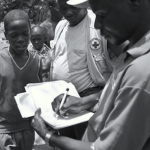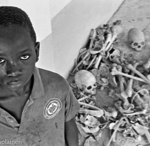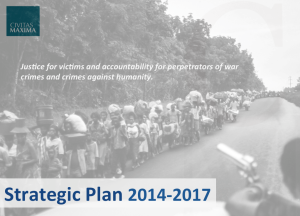What Does a War Criminal Look Like?

Schaffer&Combs client Civitas Maxima has scored a breakthrough success where no other organization could.
Before Martina Johnson, allegedly one of Charles Taylor’s most infamous military commanders, was arrested last month in Belgium, no person had ever been held to account for the crimes against humanity committed in Liberia’s two, atrocious civil wars.
Ms. Johnson was arrested for her part in commanding Operation Octopus in 1992, in which, as Monica Mark of The Guardian put it, “allegations of torture were made that stood out even in a war characterised by mutilations and mass rapes.”
“Plied with drugs and guns that many had been trained to use overnight, waves of child soldiers were sent into Monrovia as cannon fodder, forcing horrified west African peacekeepers to mow them down as one of the most brutal chapters of Liberia’s civil war.”
How Civitas did it.

Through courage, relentlessness, an unswerving
belief in both the desire and the power of human beings to see justice done, and an alarming indifference to their own wellbeing, the staff of two small organizations, Civitas Maxima and it’s Liberian partner, the Global Justice and Research Project, succeeded where no police force, international court, or government could. Civitas and GJRP found and interviewed witnesses against Ms. Johnson, performed legal analysis, constructed case files, and lobbied national prosecutors in Belgium.
We are at a delicate balance point, with witnesses under potential threat.

Ms. Johnson is presumed innocent — Civitas Maxima’s leadership takes this tradition seriously. This is only a preliminary victory. Any potential conviction could be a long way off. There are many more alleged war criminals enjoying impunity today, although more arrests are expected as a result of Civitas’ relentless work. And finally, witnesses will need protection. Aside from the obvious ethical responsibility to protect people with the immense courage to come forward in a place where tens of thousands have been tortured, murdered, and disappeared, violence against witnesses could unravel future cases and perpetuate the culture of impunity.
The most extraordinary small organization we have ever worked with.
Founded by the young international prosecutor Alain Werner in Geneva,

Civitas Maxima works in places where no other entity can or will. With local partners on the ground always in the lead, Civitas seeks justice for victims and accountability for perpetrators of war crimes and crimes against humanity, and through this process, intends to deter future crimes. Its work on the ground in Liberia is led by a well known former journalist Hassan Bility, who himself was imprisoned and tortured by former Liberian president Charles Taylor’s regime.
Civitas Maxima does three things in order to accomplish its mission: it builds case files through research, interviews, deposition, and legal analysis; seeks applicable jurisdictions and brings its case files to appropriate prosecutors and police; and builds local capacity at every step of the process so that local people may seek justice on their own, and contribute to creating peace and security in their home countries.
Schaffer&Combs spent a rewarding six months immersed in Civitas Maxima and the Global Justice and Research Project in order to produce an actionable strategic plan. Today, we are supporting fundraising infrastructure in North America. These organizations are part of our daily consciousness, so when news of Martina Johnson’s arrest came in last month, it was hard to choose descriptors for our many and complex feelings. Suffice it to say that we celebrated very quietly. We feel immense pride in our association, however modest, with these organizations. We know just enough to understand how much effort, courage, patience, and faith in one another this required from all of them.
So, what does a war criminal look like?
Ms. Johnson compels us to confront the glaringly obvious fact that viciousness is not confined to any particular physical stereotype. In some ways, this is an opportunity for us to grow up just a bit as a civilization, to stop seeing the Other whenever it’s convenient, start looking at ourselves as one species, and begin to invest the resources necessary to erode impunity with regard to war crimes, crimes against humanity, and gender-based violence in conflict zones.
Recent Posts
- Our Search Division is Ramping Up to Meet Increasing Demand for Talented, Purpose-Driven Executives
- 2020 Demanded Smart Strategies From Every Organization – Here’s What We’ve Been Working On
- S&C supports major new alliance in apparel industry
- Call it What it is: Power
- Schaffer&Combs places Higg Co’s incoming Vice President, Marketing & Communications and Senior Manager Sales

Recent Comments